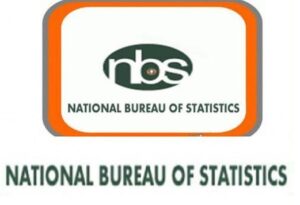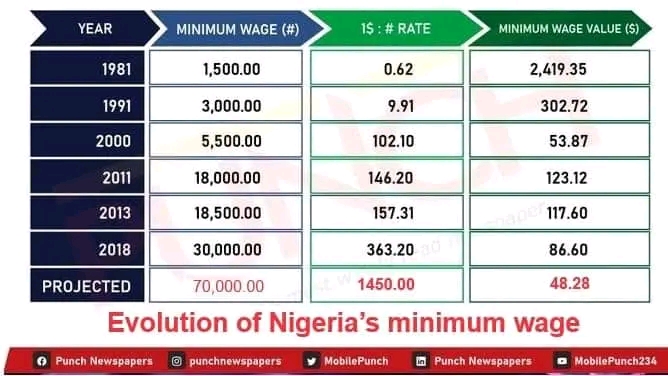Nigeria is a West African country which is bordered to the north by Niger, to the east by Chad and Cameroon, to the south by the Gulf of Guinea of the Atlantic Ocean, and to the west by Benin.
The population of this country which is regarded as one of the most populous countries in Africa as at 2024 stands at a population of 229,152,217, a 2.39% increase from 2023.
On Thursday, July 18, The federal government of Nigeria led by his Excellency, Bola Ahmed Tinubu alongside the organised Labour agreed to put an end to the lingering minimum wage saga by accepting the #70,000 proposal from the Federal government.
This has caused a long debate and several mathematicians have taken up their calculators to point out the survival of an average Nigerian in this time of the economy.
The federal bureau of statistics (FBS) has put the #70,000 minimum wage as the least kn valuation after rating it at 48.28 present.
The closest minimum wage valuation to the President Tinubu-led administration was in 2000 ex-President Olusegun Obasanjo approved #5,500 as minimum and was valued at 53.87 percent.
The best valued minimum wage since 1981 was in the same year when the national minimum wage was at a staggering #1,500 when one U.S dollar was equal to 0.62 Naira.
As projected by FBS, the minimum wage as agreed stands at #70,000 when one dollar is equal to a whopping 1450 Naira, meaning that an average Nigerian worker will take home approximately 49 dollars.
Should the dollar continue to rise as certain information as gathered as of today, July 20 will suggest a dollar to rise to 1700 Naira, it means that an average Nigerian worker will go home with 41 dollars a month.
This is coming as the National Bureau of Statistics, NBS has put the national cost of a healthy diet at N1,041 per meal.
This portends that the newly approved N70,000 minimum wage can only buy a healthy diet 67 times.
According to the Bureau, a kilogram of Tomato as of May, 2024 stood at N1,500 per kg, meaning that the proposed minimum wage can buy 46 kg of Tomato.
The average price of a litre of petrol stood at N750 for the month of June based on the NBS data and this would mean that the approved minimum wage can only buy 93 litres of fuel.




